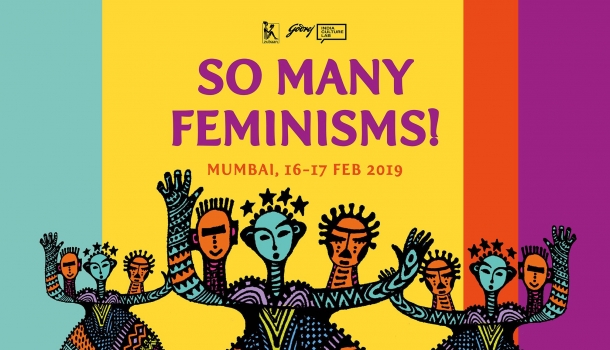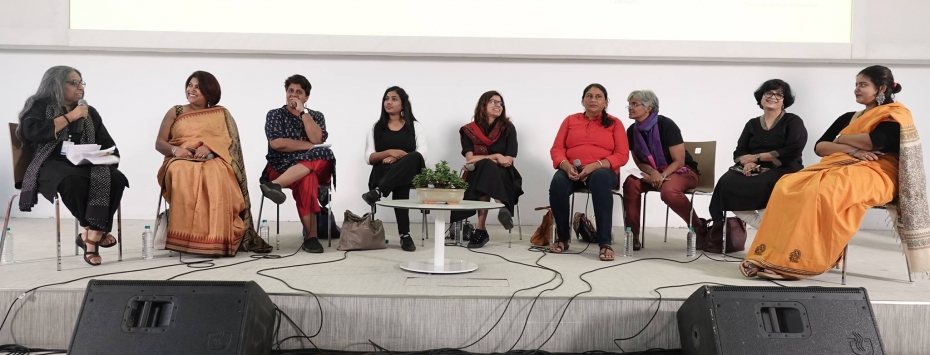The event kickstarted on February 16 with the session The Past is Before Us – A Discussion on the Histories of Women’s Movements which looked back at the ways in which grassroots activism, online campaigning and institution-making have established a tradition of feminist dissent.The session was moderated by Urvashi Butalia, India’s first feminist publisher, and now director of Zubaan.
The panelists included Rituparna Chatterjee, who runs the Twitter handle @IndiaMeToo; Manisha Mashaal, an anti-caste activist, singer, orator and founder of Swabhimaan Society; Hasina Khan, a feminist activist and founder of Bebaak Collective; Alankrita Shrivastava, an award-winning filmmaker and director of Lipstick Under My Burkha; A Revathi, a trans activist, theatre artist and the author of the book A Life in Trans Activism.
It was followed by a discussion on Women at Work: From Fields to Factories on women working in different sectors of the economy address questions of women’s relationship with labour. The panelists included Nidhi Arora, co-founder and executive director of Dhriiti - The Courage Within which promotes self-employment and entrepreneurship; Manjula Pradeep, human rights activist and founder of Wayve Foundation; Manjima Bhattacharjya, feminist researcher and author of Mannequin: Working Women in India's Glamour Industry; Jyoti Nale, a development professional and director of programs at Save the Children India; Baby Halder, a domestic worker and author of the acclaimed autobiography A Life Less Ordinary. The session was moderated by our Lab head Parmesh Shahani.
Our session Queering The Pitch: A Post-377 Conversation explored how queer activists are organising themselves post-377, and where do they identify the future grounds for our fights for equal rights. The panellists included Smita Vanniyar, a queer feminist working with Point of View; Shubha Chacko, executive director of Solidarity Foundation; Durga Gawde, sculptor and activist; Amita Karadkhedkar, leader of an ERG for the captive of a major UK bank; and Aditya Batavia, diversity and inclusion champion and board member of Tweet Foundation.
The first day of the event closed with a powerful performance by anti-caste theatre artists Yalgaar Sanskrutik Manch, a group that performs in rural and suburban areas in Maharashtra to create awareness about marginalised sections of society.
Day two of the event started with a screening of Rima Das’ film Bulbul Can Sing portrays the lives of three friends on the threshold of adulthood.
It was followed by a panel discussion Feminist Art Worlds spoke delved on how women practicing across different modes of art address or engage with questions of gender and feminism in their work. It featured panelists Alyen Foning, a designer and artist; Kundo Yumnam, an artist who works with paintings, drawings, and installations; Zubeni Lotha, a photographer based in Dimapur and Delhi; and theatre artist Lapdiang Syiem.
The final panel discussion So Many Feminisms!: Feminist Futures brought together feminist voices from diverse fields of knowledge and practice to discuss what lies ahead. The panelists included Sharda Ugra, a veteran sports journalist; Nidhi Goyal, director of Rising Flame and India's first disabled comedian; Dr Meena Gopal, chairperson of Advanced Centre for Women's Studies at the School of Development Studies, TISS; Jyotsna Siddharth, actor, activist and founder of Project Anti-Caste, Love and co-founder of Sive; Divya Kandukuri, journalist and founding member of Bluedawn Mental Health care group; and Ashwaq Masoodi; an award-winning journalist.
The closing performances of the event were by Lapdiang Syiem and leading female rapper Dee MC.



